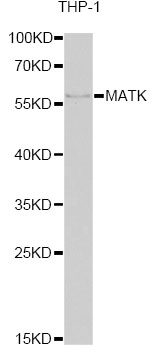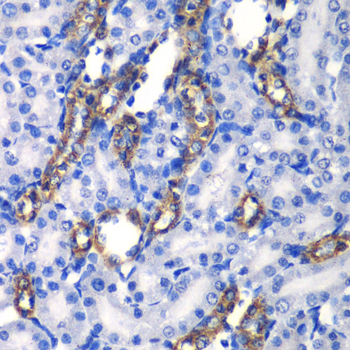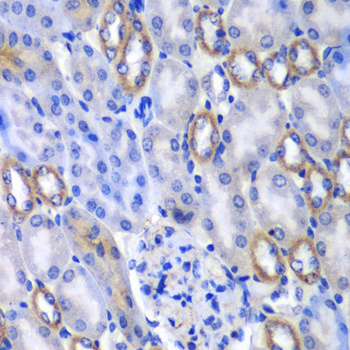-
Product Name
MATK Polyclonal Antibody
- Documents
-
Description
Polyclonal antibody to MATK
-
Tested applications
WB, IHC
-
Species reactivity
Human, Mouse, Rat
-
Alternative names
MATK antibody; CHK antibody; CTK antibody; HHYLTK antibody; HYL antibody; HYLTK antibody; Lsk antibody; megakaryocyte-associated tyrosine kinase antibody
-
Isotype
Rabbit IgG
-
Preparation
Antigen: Recombinant fusion protein containing a sequence corresponding to amino acids 352-466 of human MATK (NP_647611.1).
-
Clonality
Polyclonal
-
Formulation
PBS with 0.02% sodium azide, 50% glycerol, pH7.3.
-
Storage instructions
Store at -20℃. Avoid freeze / thaw cycles.
-
Applications
WB 1:500 - 1:2000
IHC 1:50 - 1:200 -
Validations

Western blot - MATK Polyclonal Antibody
Western blot analysis of extracts of THP-1 cells, using MATK antibody at 1:1000 dilution.Secondary antibody: HRP Goat Anti-Rabbit IgG (H+L) at 1:10000 dilution.Lysates/proteins: 25ug per lane.Blocking buffer: 3% nonfat dry milk in TBST.Detection: ECL Basic Kit .Exposure time: 90s.

Immunohistochemistry - MATK Polyclonal Antibody
Immunohistochemistry of paraffin-embedded rat kidney using MATK antibody at dilution of 1:100 (40x lens).

Immunohistochemistry - MATK Polyclonal Antibody
Immunohistochemistry of paraffin-embedded mouse kidney using MATK antibody at dilution of 1:100 (40x lens).
-
Background
Could play a significant role in the signal transduction of hematopoietic cells. May regulate tyrosine kinase activity of SRC-family members in brain by specifically phosphorylating their C-terminal regulatory tyrosine residue which acts as a negative regulatory site. It may play an inhibitory role in the control of T-cell proliferation.
Related Products / Services
Please note: All products are "FOR RESEARCH USE ONLY AND ARE NOT INTENDED FOR DIAGNOSTIC OR THERAPEUTIC USE"
